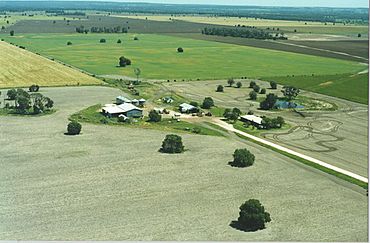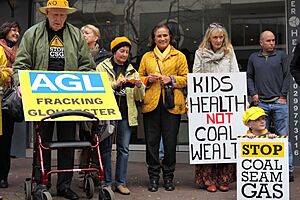Hopeland, Queensland facts for kids
Quick facts for kids HopelandQueensland |
|||||||||||||||
|---|---|---|---|---|---|---|---|---|---|---|---|---|---|---|---|

Aerial view of a farm in Hopeland, 2002
|
|||||||||||||||
| Population | 128 (2021 census) | ||||||||||||||
| • Density | 0.4661/km2 (1.207/sq mi) | ||||||||||||||
| Postcode(s) | 4413 | ||||||||||||||
| Area | 274.6 km2 (106.0 sq mi) | ||||||||||||||
| Time zone | AEST (UTC+10:00) | ||||||||||||||
| Location |
|
||||||||||||||
| LGA(s) | Western Downs Region | ||||||||||||||
| State electorate(s) | Callide | ||||||||||||||
| Federal Division(s) | Maranoa | ||||||||||||||
|
|||||||||||||||
Hopeland is a small rural area, or locality, located in the Western Downs Region of Queensland, Australia. In 2021, about 128 people lived in Hopeland.
Contents
Exploring Hopeland's Location
Hopeland is found south-east of Chinchilla. It sits on the Darling Downs, an area famous for its rich, dark, and fertile soil. This region is part of what's called the Southern Brigalow Belt.
Rivers and Creeks in Hopeland
The northern edge of Hopeland is marked by the Condamine River. On the south-western side, you'll find Wambo Creek. This creek flows into the Condamine River.
A Look at Hopeland's Past
Hopeland has a simple but interesting history. Like many small towns, it once had its own school.
Hopeland State School
Hopeland State School first opened its doors on 8 February 1937. Its first teacher was Lionel Stevens. In its first year, about 16 students attended the school. The school stopped operating on 4 November 2006 and officially closed on 23 October 2007. It was located at 821 Chinchilla-Kogan Road.
Community Action in Hopeland
In July 2015, people from Hopeland and nearby areas took action. They gathered over 9,000 signatures on a petition. They traveled to Sydney to give this petition to the Prime Minister at the time, Tony Abbott.
The petition asked the government to stop a process called fracking on farms. It also asked for health checks to be required for coal seam gas projects. People were worried about these activities happening near homes and farms.
How Many People Live in Hopeland?
The number of people living in Hopeland has changed a little over the years.
- In 2016, the population of Hopeland was 140 people.
- By 2021, the population had changed to 128 people.
What Drives Hopeland's Economy?
Hopeland's economy is mostly based on farming. The soil here is very special.
Farming in Hopeland
The heavy black soil in Hopeland is considered some of the best in Australia. It's great for growing many different crops. This is because the soil holds water well and helps plants grow big and strong.
Farmers in Hopeland use both dryland farming (relying on rain) and irrigation (using extra water) to grow crops. They produce things like sorghum, cotton, corn, wheat, millet, chick pea, mung bean, barley, triticale, and oats. Because of the rich soil, farmers in this area often win awards for their crops. For example, a dryland sorghum crop once grew over 10 tonnes per hectare.
Energy and Environmental Concerns
All of Hopeland is located within areas where companies can extract coal seam gas. This process involves getting natural gas from underground coal layers.
However, extracting coal seam gas in farming areas can be controversial. Some people worry that it might affect the underground water that farmers use for their crops and animals. In April 2018, a company called Linc Energy was found to have caused environmental harm.
Learning in and Around Hopeland
There are no schools located directly in Hopeland today.
Nearby Schools
Students in Hopeland attend schools in nearby towns.
- For primary school, the closest government schools are Chinchilla State School in Chinchilla, Brigalow State School in Brigalow, and Kogan State School in Kogan.
- For high school, the nearest government secondary school is Chinchilla State High School, also in Chinchilla.
 | Charles R. Drew |
 | Benjamin Banneker |
 | Jane C. Wright |
 | Roger Arliner Young |



